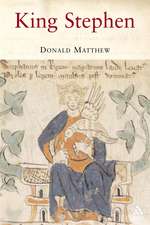After the Stasi: Collaboration and the Struggle for Sovereign Subjectivity in the Writing of German Unification
Autor Annie Ringen Limba Engleză Paperback – 22 mar 2017
| Toate formatele și edițiile | Preț | Express |
|---|---|---|
| Paperback (1) | 258.15 lei 6-8 săpt. | |
| Bloomsbury Publishing – 22 mar 2017 | 258.15 lei 6-8 săpt. | |
| Hardback (1) | 716.15 lei 6-8 săpt. | |
| Bloomsbury Publishing – 21 oct 2015 | 716.15 lei 6-8 săpt. |
Preț: 258.15 lei
Preț vechi: 295.74 lei
-13% Nou
Puncte Express: 387
Preț estimativ în valută:
49.40€ • 53.83$ • 41.62£
49.40€ • 53.83$ • 41.62£
Carte tipărită la comandă
Livrare economică 23 aprilie-07 mai
Preluare comenzi: 021 569.72.76
Specificații
ISBN-13: 9781350029736
ISBN-10: 1350029734
Pagini: 280
Ilustrații: 4 b/w illustrations
Dimensiuni: 156 x 234 x 20 mm
Greutate: 0.4 kg
Ediția:NIPPOD
Editura: Bloomsbury Publishing
Colecția Bloomsbury Academic
Locul publicării:London, United Kingdom
ISBN-10: 1350029734
Pagini: 280
Ilustrații: 4 b/w illustrations
Dimensiuni: 156 x 234 x 20 mm
Greutate: 0.4 kg
Ediția:NIPPOD
Editura: Bloomsbury Publishing
Colecția Bloomsbury Academic
Locul publicării:London, United Kingdom
Caracteristici
Uses newly released files from the East German Stasi archives to provide authoritative historical contexts for the writing of the period
Notă biografică
Annie Ring is Lecturer in German at University College London, UK.
Cuprins
List of Illustrations Acknowledgements Notes on the TextIntroduction Collaboration and the Problem of Sovereign Subjectivity Chapter 1 The Psychic Life of Collaboration: Monika Maron's Stille Zeile Sechs Chapter 2 Mapping the Topography of Surveillance in Wolfgang Hilbig's "Ich" and Kerstin Hensel's Tanz Am Kanal Chapter 3 Collaboration as Collapse in the Stasi Files and Life Writing of Monika Maron and Christa Wolf Chapter 4 Prison/Writing: The Subject of the Stasi Archive Chapter 5 Animals and the Limits of Sovereignty in the Writing of Unified Germany Chapter 6 Capitalist Complicity in Wolfgang Hilbig's Last Prose Works Conclusion After the Stasi: Complicity and Cooperation Bibliography Index
Recenzii
In addition to suturing the GDR experience of collaborative subjectivity to the ongoing present, Ring also links this literature to its earlier incarnations in the history of literary modernism. Reaching as far back as Faust, Penthesilea, and "Bartleby, the Scrivener," which harken forward to the protagonists of "Ich," animal triste, and Stille Zeile sechs, Ring implicitly reconstructs one tentacle of the sprawling Modernism Monster that is often overlooked by its many researchers. She achieves this most effectively by tracing some of her authors, chiefly Hensel and Hilbig, back to Kafka, that master of liminal subjectivity whose works were not always welcome and available behind the Iron Curtain. The "complex of agency and vulnerability" (83) shared by the work of these three authors gives needed intertextual literary nuance to a body of GDR fiction that is often otherwise read for its political and historical interest.
Overall, it is an excellent introduction to the difficulties faced by the authors of the GDR and their transition to a new reality. After the Stasi is a work that one would recommend to those who have more than a passing understanding of the intricacies of Germany's reunification and the contemporary literary scene in Germany.
Overall, it is an excellent introduction to the difficulties faced by the authors of the GDR and their transition to a new reality. After the Stasi is a work that one would recommend to those who have more than a passing understanding of the intricacies of Germany's reunification and the contemporary literary scene in Germany.














